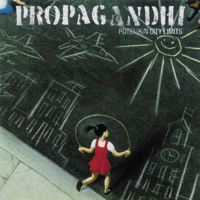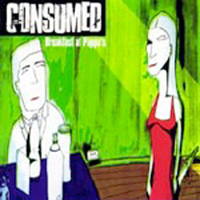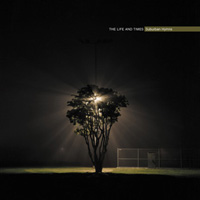 Propagandhi
Propagandhi
Potemkin City Limits (Fat Wreck Chords)
An interview with guitarist/vocalist Chris “Glen Lambert” Hannah
By Tim Den
At the risk of being ridiculed by the band themselves, I hereby declare Propagandhi the most important punk rock band today. Yes, that’s more “music journalism” hyperbole for the band to mock. Yes, that could be viewed as yet another overblown statement made by yet another worthless review. But fucking goddamnit, I don’t know how else to be more honest. However you’d like to define the term “punk rock” in the year 2006, Propagandhi have every other band beat. They thrash like maniacs, tell superb jokes, use sarcasm as an effective literary device, are articulate and well-referenced in their subject matter, and they champion the true essence of hands-on D.I.Y. ethic found not just in the genre’s beginnings, but in compassionate humanitarians around the world and throughout history. They practice what they preach in that they have remained true to their musical loyalties and social consciousness, even as so-called “independent music” began to mainstream certain chord progressions and Leftist sloganeering. They continue to educate themselves instead of dumbing down for their audience, exploring both musical and lyrical progress because THAT’S WHAT MUSIC IS SUPPOSED TO BE ABOUT. They are not interested in “gaining and maintaining” a “fanbase”: They work hard at refining their art, living an informed existence, never wavering in the face of modern society’s accelerating self-destruction. Maybe caring about nature, ethnicities other than your own, the hypocrisy of warfare, the crippling effects of poverty, the causes behind such atrocities, and the bringing to justice of said causes aren’t commendable in a perfect world, but SHIT, man, these are all but nonexistent thoughts in most of 2006’s population. And the fact that Propagandhi are saying it faster, angrier, more urgently, and with scholarly vocabulary is proof that they have no equals.
Potemkin City Limits is the natural reaction to what the world has witnessed in the past four years, expressed better than anything else I’ve heard thus far. Even sonically, its complex, spiraling, claustrophobic arrangements suggest the mental state of its creators: Pushed to the brink by the madness and surrealistic mindset of its fellow citizens, foaming at the mouth in trying to bring about the end of the façade addressed in the title. Life today has sanity hanging by a thread, with all goodness seemingly defeated and everyone too occupied with their daily routines to care. On this record, it sounds like Propagandhi have reached exhaustion. Every word, every chord, every beat is absolutely drenched in the very last of their strength, so much so that I’m surprised they have energy left to face another dreary, hopeless day. But perhaps they understand that they are the final torchbearers of light, the last bastion of guidance for people who don’t trudge through malls to look at total shit and/or sit their fat asses in front of the TV instead of considering the outside world. For this small percentage of individuals, Potemkin City Limits is a source of courage and inspiration.
As hair-raising, minor-based thrashfests stab you in your ears, their emotional impact – largely due to guitarist/vocalist Chris “Glen Lambert” Hannah’s passionate delivery – boil your blood. The words – manifestos that I will soon be memorizing – then add the hot sauce to complete the body-bursting experience. I genuinely feel like I’m busting out of my skin when I listen to Potemkin City Limits – the intensity of the music and the words pins me in the red – achieving the effect that the band hopes for in everyone: To get up, go out there, and live as a better human being (while listening to progressive, soul-searing, transcendental music). As Hannah yells “just cuz we were young, it don’t mean we were wrong” in “Rock for Sustainable Capitalism,” redemption is given to anyone and everyone who continues to believe in the power of honest music. As he details a scenario in which corrupt powers receive just retribution (closer “Iteration,” by far the album’s crown jewel. I feel a real sense of righteous revenge. “Can’t gouge 10,000 eyes from a single head, so I think we should observe a sentence that will serve to satisfy both a sense of function and poetry: So you will spend the rest of your days drenched in sweat, with your face drawn in a rictus of terror as you remove another buried land mine fuse. Meanwhile, 100 yards back behind the sandbags, a legless foreman pulls the trigger on a red megaphone. Squelching feedback. Drunken laughter. Broken English. His dead daughter’s picture. Time and tide, no one can anticipate the inevitable waves of change.” Maybe I’m as thirsty for such vengeance as Hannah, but I am SPEECHLESS at the perfection of this description. I almost cried the first time I read along with the song, and I’m not afraid to admit it.
On their earlier albums, the band mixed humor with politics equally in an effort to not come off as disciplinary elitists. But even as their sensible (to sane human beings at least) views on issues have remained the same throughout the years, who can blame them for losing the slapstick act? It’s true that every album contain less and less irreverence and major-chord happy-sounding songs, but the band have stayed down-to-earth and humble by slipping in the occasional fart anecdote and self-deprecation. Okay, maybe some of you think that’s not enough. But in light of all the serious topics that need to be covered, it provides sufficient evidence that the band are still regular guys who happen to read and care and know a shitload more about what’s wrong with society today and are able to sum it up in rollercoaster songs.
There’re reasons why Propagandhi release an album every half a decade or so: 1) they take notice of things other than entertainment, meaning music does not take priority over compassionate living, 2) they research and deliberate over their messages and prose, as painfully evident in the end results, and 3) their quest for the ultimate prog-thrash pinnacle takes time. As Potemkin City Limits shows, they have once again outdone themselves.
 As Jord points out in the liner notes, entertainment as an exclusive means of “change” has failed miserably. So why do Propagandhi keep at it? Why continue to play the music game when it’s obviously rotten through and through? Why run G7, buy advertising, put out records, when you despise the industry?
As Jord points out in the liner notes, entertainment as an exclusive means of “change” has failed miserably. So why do Propagandhi keep at it? Why continue to play the music game when it’s obviously rotten through and through? Why run G7, buy advertising, put out records, when you despise the industry?
We believe music has the power to influence the world around us, and each of us have personal experiences that speak to music’s power to transform an individual. Currently, the prevailing trend is toward using that power to encourage consumerism at the expense of ideas: Make kids dumber, make punk bands richer. It doesn’t have to be this way, and we think it’s worth putting a dialogue about music, rebellion, and co-optation back on the agenda.
I think about a life led exclusively in the service of the community and the planet all the time. I’m 35 with a grade 12 education and no employment skills, so it wouldn’t be a simple transition, but it will be inevitable. Sooner than later, I imagine.
“Rock For Sustainable Capitalism” attacks “independent” music and its allegiances with certain capitalistic-minded corporations, but if you start to pick every single relationship apart, wouldn’t owning a computer, buying gas, buying food from supermarkets, etc. all sorta of fall under the same accusations? Just how DO you escape from the global corporate system?
Much was decided before we were born. We’ve been born into this system. I imagine that escaping it without isolating yourself would be difficult. Our laments about the evolution of the punk scene into a lucrative mainstream business aren’t intended as a set of rules for how people should conduct themselves. The point is to provoke dialogue about the co-optation of (politically radical) subculture and to make people think about the difference between compromise and outright collaboration.
As revealed in “Name and Address Withheld,” you seem much more focused on vengeance these days, less optimistic than your past efforts. And while I’m often of the same mentality – pure retaliation out of frustration – that’s ultimately not an answer, no? I’m asking because it’s getting to the point where I feel like we SHOULD physically retaliate, even if it means mutually assured destruction. Why? Cuz humans deserve to bring about their own fucking undoing already.
Songs like “Name and Address Withheld” and “A Speculative Fiction” are meditations on the concepts of justice and vengeance within specific geopolitical contexts, yes. People, including myself, have been bred with mixed messages that often leave them confused about which is which. But there is no justice in vengeance. That’s the bottom line of those songs.
I get the feeling that this album might be branded by some as finger-pointing elitism. If you were ever accused as such, how would you defend yourselves? What would you offer as alternatives to the problems that you’ve mapped out and mocked as “how the world works”?
I wouldn’t defend myself beyond suggesting what I said earlier: That we’re not asserting rules for behavior. In terms of the song “Rock For Sustainable Capitalism,” which I think you’re referring to, we’re merely putting a dialogue about music and business back on the agenda, where it belongs. Many people making money hand over fist don’t want it back on the agenda. They don’t want listeners to develop critical ideas about the economics of music, and they don’t want them to expect more from bands and labels claiming to be “punks” or “rebels.” They particularly don’t want their target audiences to change their consumption habits. Hence, people get defensive when something threatens to rock the boat.
In my opinion, every record you make outshines the previous one by miles. But as your compositions are getting smarter and more intricate, it seems like audiences are getting dumber with every passing year (see current indie/emo/punk/metal/hardcore/fucktard trends). Do you get cynical toward listeners?
Listeners have no reason to evaluate music from any other perspective than shallow ones. It’s really all that’s been offered to them by punk bands since 1990. I don’t think we’re the ones who are cynical. The bands that make money selling lifestyle and image are cynical. They underestimate and do injustice to music’s real power. I say this first and foremost as a music listener. I definitely agree that many bands are offering less and less to their audiences.
 You’ve often berated yourselves with self-deprecating, hilariously humble adjectives. But with the seriousness of the topics that you tackle – not to mention the witty, insightful ways with which you tackle them – should listeners take you seriously? Or dismiss you as the “not groundbreaking, not anticipated” group you make yourselves out to be?
You’ve often berated yourselves with self-deprecating, hilariously humble adjectives. But with the seriousness of the topics that you tackle – not to mention the witty, insightful ways with which you tackle them – should listeners take you seriously? Or dismiss you as the “not groundbreaking, not anticipated” group you make yourselves out to be?
It’s up to them if they feel we can be taken seriously. Compelling art – political art – is totally subjective. If what we put into our songs doesn’t resonate with someone, they’re not obligated to pursue it further. I don’t take it personally. Anyone who would might need to reconsider their exaggerated sense of self-importance.
Rant: It’s extremely hard for me these days to believe in making any difference. “Counterculture” has been co-opted, people are using “revolution” as a slogan to distinguish their hip-ness, even in grass roots organizations, hierarchies and battles over coolness are inescapable.
As I mentioned earlier, compelling political art is a subjective experience, and it exists. It’s everywhere. Just not present in the mainstream punk scene, generally. There’s almost nothing there worth checking out. People would do well to look outside the limited options they’re generally served up by the punk rock establishment.
Punk rock used to be the other side of the mainstream’s slick, bullshit coin. But now that punk rock IS slick and mainstream – making “rebellion” marketable – no one needs to look elsewhere for “alternatives.” You can get it in easily-digestible doses via MTV, so why would you listen to Los Crudos? If you want to separate yourself from the Hilary Duff/Justin Timberlake bullshit, you only have to go as far as Good Charlotte for a complete identity makeover. When Black Flag is being cited as influence by bands like The Ataris, where are the Black Flags of today? Or is the dream of underground rebirth a joke?
People listen to and make music for a wide variety of reasons. I don’t begrudge anyone for liking the sounds coming out of their radios or TVs, I just lament the cynicism of labels and bands who, by their emphasis on market share and profit over compelling art, resort to formula and safety in terms of aesthetics, messages, and modes of behavior. And when someone like me – a dude in a relatively conventional heavy rock band – is moved to lament it, you know how sterile it really has become.
I’m beginning to believe that nature is phasing us out, which is why it built such despicable traits into our species’ behavior pattern in the first place.
I can relate to that impulse, but feel that the world is what we decide to make it, rather than the other way around. The direction we’re currently heading in is not inevitable. Probable, but not inevitable. All is not lost, though it may appear so.
Regarding your criticism of music journalists: Do you think we’re all bitter ex-musicians filling the pages with nonsense just to sell ads? If so, why deal with us at all? And even if all music journalists are ex-musicians, would you recommend that they abandon their love for music – if not the creating of, then at least the support of it through their publications – in exchange for a “real job” when they are still trying to “spread the word”?
Well, no doubt there’s some hyperbole and broad-brushes in there for the purpose of illustrating a private speculation about the symbiosis between music and music journalism these days. I feel it’s safe to suggest that there is, in fact, almost no actual journalism involved in the process. Stenography, yes. Journalism, no. I’d never suggest anyone abandon their love of music, only that they not become cheerleaders for crap in exchange for advertising revenue.
(www.fatwreck.com)



